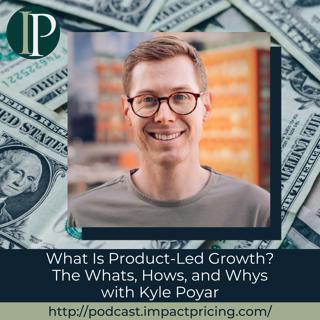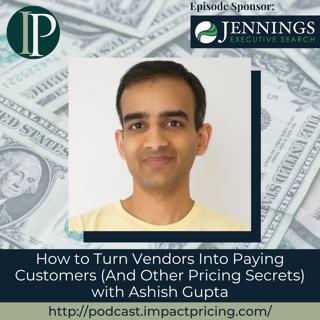
How to Turn Vendors Into Paying Customers (And Other Pricing Secrets) with Ashish Gupta
Ashish Gupta, founder and CEO of ScaleUp Exec, brings a unique perspective to pricing from his experience building and selling multiple companies across technology, e-commerce, and subscription businesses. Starting his career at Anheuser-Busch (as the company's only non-drinker), Ashish has led businesses from startup to eight-figure valuations, giving him deep insights into pricing across different business models and growth stages. In this episode, Ashish shares unconventional pricing strategies that transformed his businesses, including how he convinced vendors to provide products for free by repositioning his company as a marketing partner rather than a traditional retailer. Why you have to check out today's podcast: Discover how to identify and target the specific customer segments willing to pay premium prices for your unique value proposition. Learn the "influencer plus" strategy that transforms vendor relationships from cost centers into revenue-generating partnerships. Understand how subscription businesses create deeper customer relationships and the pricing implications of holding customer credit cards. "Instead of trying to go to a general audience, which may or may not be interested in paying you more for something unique about your product, really try and understand who is that core set of people that will find real value and be willing to pay for that value." – Ashish Gupta Topics Covered: 01:48 — Ashish's entrepreneurial journey: From Anheuser-Busch to multiple successful exits. 03:42 — The psychology of subscription pricing: Why holding credit cards creates deeper customer relationships. 07:54 — Win, Keep, Grow framework: The often-overlooked "grow" component in subscription businesses. 11:03 — ScaleUp Exec's fractional COO model: Bringing enterprise talent to small and medium businesses. 13:45 — Revenue growth strategies: How COOs approach customer acquisition and diversification differently. 17:34 — The pricing audit revelation: Why PE firms consistently find underpriced acquisitions. 22:01 — The "off balance sheet CFO" positioning strategy for premium pricing. 22:58 — The vendor flip strategy: From paying wholesale to getting products for free. 24:04 — Building the "influencer plus" model: Combining audience and distribution for vendor value. Key Takeaways: "I think relationship and subscription are, they kind of go hand in hand. That means I have to always be getting value. I have to have this confidence that, if somebody has my credit card and I've given them authorization to charge it versus like, let's say an Amazon, I'm proactively going in and saying, yes, I want this item." – Ashish Gupta "If we can build out our own audience, and grow that audience to be something meaningful and have a deep connection with that audience so that they really trust us, our brand as a retailer, then we can actually talk with our vendors and say, hey, we're no longer a retailer, we're really a marketing company." – Ashish Gupta Resources and People Mentioned: Anheuser-Busch: https://www.anheuser-busch.com Shopify Shop Pay: https://www.shopify.com/shop-pay PayPal: https://www.paypal.com/ Mark Stiving's book: "Win, Keep, Grow" about subscription businesses Connect with Ashish Gupta: Website: https://scaleupexec.com/ Linkedin: https://www.linkedin.com/in/ashish-gup/ Connect with Mark Stiving: LinkedIn: https://www.linkedin.com/in/stiving/ Email: mark@impactpricing.com
11 Elo 28min

Blogcast: Why Pricing AI Is So Hard
This is an Impact Pricing Blog published on June 9, 2025, turned into an audio podcast so you can listen on the go. Read Full Article Here: https://impactpricing.com/blog/why-pricing-ai-is-so-hard/ If you have any feedback, definitely send it. You can reach us at mark@impactpricing.com. Now, go make an impact. Connect with Mark Stiving: Email: mark@impactpricing.com LinkedIn: https://www.linkedin.com/in/stiving/
8 Elo 3min
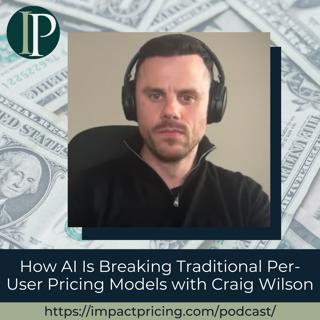
How AI Is Breaking Traditional Per-User Pricing Models with Craig Wilson
Craig Wilson, Director of Pricing and Packaging at Moody's Analytics, brings extensive experience from major financial services companies including S&P and Experian. Starting his career in financial analysis at a Scottish car retailer after his soccer dreams didn't materialize, Craig discovered his natural strengths in numbers and analytical tools, leading him to specialize in pricing across subscription products, deal desk operations, and information technology services. In this episode, Craig explores the dual challenge of AI in pricing: how to monetize AI-enhanced products and how to leverage AI tools for pricing decisions. Drawing from his experience at Moody's, he discusses why traditional pricing principles still apply to AI products while acknowledging the fundamental disruption AI creates for per-user models. Craig shares practical insights on using AI as a pricing coach and the critical importance of early involvement in product development. Why you have to check out today's podcast: Learn why AI pricing follows traditional value-based principles but requires new approaches to pricing metrics and value capture. Discover practical ways to use AI tools like Microsoft Copilot for pricing strategy, stakeholder communication, and sales enablement. Understand the critical timing of pricing involvement in AI product development to influence monetization strategies from the ground up. "Get involved in the product development process as early as possible, particularly in the era of Gen AI and agentic AI." – Craig Wilson Topics Covered: 01:30 — Craig's pricing journey: From Scottish car retailer to Moody's Analytics pricing leader 04:15 — Why AI pricing fundamentals haven't changed: Still about value creation and capture 06:30 — The consensus problem: No clear patterns yet in AI pricing 08:45 — Use case example: using AI to do pricing 11:15 — Using AI as a pricing coach: Daily conversations with Microsoft Copilot for strategy development 14:30 — Communication enhancement: Translating pricing concepts for different business personas 16:45 — Sales enablement evolution: AI-powered guidance for complex solution positioning 19:20 — Trust and validation concerns: The information vs. agentic AI distinction 21:45 — Economic value estimation: How AI can finally make this pricing holy grail practical 23:30 — The monetization investment gap: Companies building AI capabilities without pricing strategies Key Takeaways: On Early Involvement in Product Development: "Get involved in the product development process as early as possible, particularly in the era of Gen AI and agentic AI." – Craig Wilson On Per-User Pricing's Death: "In the world of particularly agentic AI solutions, the per-user model is becoming obsolete. I can't see a place for it." – Craig Wilson Resources and People Mentioned: Moody's Analytics: https://www.moodysanalytics.com/ Tom Nagle: "Strategy and Tactics of Pricing" book: https://www.taylorfrancis.com/books/mono/10.4324/9781315266220/strategy-tactics-pricing-thomas-nagle-john-hogan-joseph-zale Steven Forth: https://www.linkedin.com/in/stevenforth/ Kyle Poyar: https://www.linkedin.com/in/kyle-poyar/ Stuart Wintertere: LinkedIn thought leader on AI value Microsoft Copilot: Daily AI coaching tool Connect with Craig Wilson: LinkedIn: https://www.linkedin.com/in/craig-wilson-5857ba4a/ Email: craig.wilson@moodys.com Connect with Mark Stiving: LinkedIn: https://www.linkedin.com/in/stiving/ Email: mark@impactpricing.com
4 Elo 25min

Blogcast: Jobs to Be Done vs. Problems and Results: What’s More Useful in B2B?
This is an Impact Pricing Blog published on June 2, 2025, turned into an audio podcast so you can listen on the go. Read Full Article Here: https://impactpricing.com/blog/jobs-to-be-done-vs-problems-and-results-whats-more-useful-in-b2b/ If you have any feedback, definitely send it. You can reach us at mark@impactpricing.com. Now, go make an impact. Connect with Mark Stiving: Email: mark@impactpricing.com LinkedIn: https://www.linkedin.com/in/stiving/
1 Elo 3min

COMPASS Framework: Rethinking Pricing Metrics in the Age of AI with Steven Forth and Michael Mansard
Steven Forth has been a frequent guest on Impact Pricing and is a co-creator of the COMPASS framework. Michael Mansard is the Principal Director of Subscription Strategy at Zora. He's an investor in and mentor to several startups, and he started his career in consulting at companies like Deloitte and SAP, so he knows a lot. In this episode, Steven and Michael dive deep into the COMPASS framework for evaluating pricing metrics in the age of AI and agentic systems, exploring how traditional SaaS economics are being turned upside down and why companies need to move away from user-based pricing models. Why you have to check out today's podcast: Learn why AI pricing fundamentally breaks the traditional SaaS model of "expensive to build, cheap to run". Understand the COMPASS framework's 14-question assessment for selecting optimal pricing metrics. Explore the accelerating cycles of pricing complexity and simplification across technology waves. "I think that most people are clueless and do not want to admit that they're clueless. And I think admission is key because admission leads you to a scientific approach to pricing and enables you to accept, to try smaller samples, especially in the age of AI." – Michael Mansard Topics Covered: 02:08 – How Michael got into pricing 03:12 – Defining business models vs. pricing models vs. pricing metrics 06:22 – Introduction to the COMPASS framework and why it exists 07:25 – How AI flips traditional SaaS economics on its head 08:03 – The gym membership paradox in AI pricing 11:05 – Steven's perspective on whether pricing fundamentals have changed 24:20 – Pricing evolution cycles and their accelerating speed 27:39 – How COMPASS captures competitive differentiation 34:28 – Michael's pricing advice on embracing iteration and admitting uncertainty Key Takeaways: "I've seen more change in my part of the technology world in the last six months than I've seen in my entire lifetime." – Steven Forth “If you price it per user, the more a user uses it, the worse margin it would yield. And that's a problem, right? So I call that the gym membership paradox." – Michael Mansard "We need to change the metric. Now the billion dollar question is what metric? And the raison d'être of that framework is exactly that. It's to help people navigate, hence the notion of COMPASS." – Michael Mansard People / Resources Mentioned: COMPASS Framework: 14-question assessment for pricing metrics: https://www.linkedin.com/pulse/compass-agentic-ai-pricing-metric-framework-your-2-part-mansard-f9qqe Roger Martin Strategic Choice Cascade: Framework for aligning pricing with business strategy: https://rogermartin.medium.com/decoding-the-strategy-choice-cascade-475d40555eb1 John Maeda's "The Laws of Simplicity": Design principles applicable to pricing models: https://lawsofsimplicity.com/ Karan Sood: https://www.linkedin.com/in/soodkaran/ PriceFX: Company introducing 125 agents: https://www.pricefx.com/ and https://lp.pricefx.com/agents_trial.html Connect with Steven Forth: LinkedIn: https://www.linkedin.com/in/stevenforth/ Email: steven@ibbaka.com Connect with Michael Mansard: LinkedIn: https://www.linkedin.com/in/michaelmansard/ Connect with Mark Stiving: LinkedIn: https://www.linkedin.com/in/stiving/ Email: mailto:mark@impactpricing.com
28 Heinä 36min
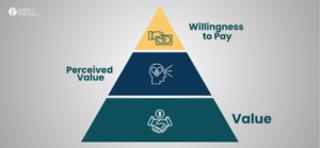
Blogcast: Value Is Not the Same as Willingness to Pay
This is an Impact Pricing Blog published on May 26, 2025, turned into an audio podcast so you can listen on the go. Read Full Article Here: https://impactpricing.com/blog/value-is-not-the-same-as-willingness-to-pay/ If you have any feedback, definitely send it. You can reach us at mark@impactpricing.com. Now, go make an impact. Connect with Mark Stiving: Email: mark@impactpricing.com LinkedIn: https://www.linkedin.com/in/stiving/
25 Heinä 4min
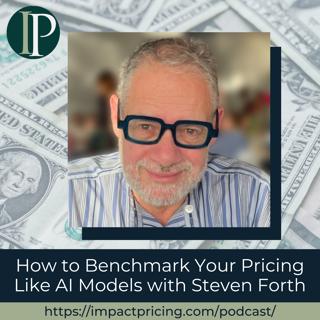
How to Benchmark Your Pricing Like AI Models with Steven Forth
Steven Forth is the Co-founder and Chief Value Officer at Ibbaka, a leading value and pricing consulting firm. With deep expertise in AI applications for pricing and value modeling, Steven is at the forefront of developing intelligent agents that help businesses understand and communicate value more effectively. His work focuses on the intersection of artificial intelligence, pricing strategy, and value creation, making him a pioneer in applying AI to solve complex pricing challenges. In this episode, Steven shares his insights on how benchmarking is revolutionizing both AI development and pricing strategy. Drawing parallels between how AI models are improved through benchmarking and how pricing models should be evaluated, he introduces a framework for measuring pricing effectiveness that could transform how we approach pricing decisions. Together with Mark, they explore the challenges of establishing "truth" in pricing, the role of synthetic data, and the future of AI-powered pricing tools. Why you have to check out today's podcast: Discover how AI benchmarking principles can revolutionize pricing model evaluation. Understand how to evaluate pricing models from both buyer and seller perspectives. Explore the future of AI-powered pricing tools and what it means for pricing professionals. "We don't start with the truth. We have to work our way towards truth through multiple iterations and applications." – Steven Forth Topics Covered: 02:15 – How Intercom's FinAI agent uses daily benchmarking to improve ticket resolution performance 05:30 – Why AI's success is built on benchmarking and how it emerged from the ImageNet competition 08:45 – The critical problem: pricing lacks standardized benchmarking like AI models have 11:20 – Michael Mansard's 12-factor pricing model assessment and its potential as an industry standard 14:10 – Why pricing models must be evaluated from both buyer and seller perspectives 17:25 – How market segmentation and use cases complicate pricing model benchmarking 20:40 – The role of synthetic data in pricing research and model validation 24:15 – Why "vibe coding" could disrupt traditional pricing consulting within 3 years 27:30 – The search for truth in pricing: hedonic pricing models and market assumptions 31:45 – Introduction to ValueIQ: Ibbaka's new AI agent for value-based selling Key Takeaways: "Anyone who says that they're data centric or data driven is actually before that they have to be model driven because they're using some form of model to organize the data." – Steven Forth "We should have done this 20 years ago. What were we thinking? Well, we weren't thinking. And we didn't have ways to do this for us anyway." – Steven Forth (on developing pricing benchmarks) "Benchmarking every day, I think, is going to be critical to the success of agents that do important business things." – Steven Forth "You can always improve your measurement, but at some point the return of improving the measurement is lower than the cost of increasing the validity of the measurement." – Steven Forth Resources and People Mentioned: Douglas Hubbard's How to Measure Anything (book): https://www.amazon.com/How-Measure-Anything-Intangibles-Business/dp/1118539273 ImageNet: https://image-net.org/ Michael Mansard's 12-Factor Pricing Model: https://www.insead.edu/bio/michael-mansard-0 Intercom's FinAI: https://www.intercom.com/help/en/articles/8205718-fin-ai-agent-resolutions Lovable, Replit, Bolt: https://linkblink.medium.com/bolt-vs-cursor-vs-replit-vs-lovable-ai-coders-comparison-guide-3b9d41e75810 ValueIQ: https://www.ibbaka.com/ibbaka-market-blog/get-ready-for-valueiq-sign-up-now-for-beta-access Connect with Steven Forth: LinkedIn: https://www.linkedin.com/in/stevenforth/ Email: steven@ibbaka.com Connect with Mark Stiving: LinkedIn: https://www.linkedin.com/in/stiving/ Email: mark@impactpricing.com
21 Heinä 35min

Blogcast: The Two Questions Every Buyer Asks—and How to Design Your Product and Pricing Around Them
This is an Impact Pricing Blog published on May 19, 2025, turned into an audio podcast so you can listen on the go. Read Full Article Here: https://impactpricing.com/blog/the-two-questions-every-buyer-asks-and-how-to-design-your-product-and-pricing-around-them/ If you have any feedback, definitely send it. You can reach us at mark@impactpricing.com. Now, go make an impact. Connect with Mark Stiving: Email: mark@impactpricing.com LinkedIn: https://www.linkedin.com/in/stiving/
18 Heinä 4min
